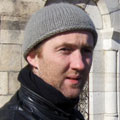
Graduated Students
Recently Graduated Students
 Name: Henry Silke
Name: Henry Silke
Email: henry.silke2@mail.dcu.ie
Supervisors: Farrel Corcoran
Project Title: Media and Political Power: the Role of the Independent News and Media Group in Representing Economic Crisis and Social Conflict in Ireland: 2008-2011.
Summary of Research Topic:
This project is concerned with the structure, content and political role of the Irish press during the current economic crisis. To do so the research will fuse the methodology of political economy (Castells 2009, Chakravartty and Schiller 2010, Fuchs 2009, Garnham 2004, McChesney 2007, Mosco 2009, Curran 2002) with that of critical content and discourse analysis (Fowler 1991, Garnham 2000, Hartley 1982, Philo 2007, Fairclough 2007, Richardson 2007). From political economy the project draws on theories of political structure, economic structure, power, ideology, and hegemony (Arrighi 2005, Wallerstein 1974a, Foucault 2000, Held 1989, Marx 2010, Miliband 1969, Lukes 1974, Althusser 1971, Eagleton 1991, Gramsci 1971/2003, Hall 1986). The study will develop a method of contextual discourse analysis drawing from Glasgow Media Group and Critical Discourse Analysis scholars. To explore the relationship between structure and content the study will perform a case study of the content of the Independent News and Media group. Independent News and Media is the dominant print media group in Ireland, its major shareholder Tony O’Reilly has extensive business interests, it is alleged by some that O’Reilly has used his media empire to leverage the state in favour of his interests, specifically in the granting of communication and hydrocarbon exploration licences (Connolly 2006, Cooper 2009).
 Name: Fergal Quinn
Name: Fergal Quinn
email: fergal.quinn6@mail.dcu.ie
Supervisor: John O'Sullivan
Project Title: Models of media encouragement in the developing world:
How Cambodia offers an example and a warning
Summary of Research Topic:
The 2008 national elections in Cambodia offered a fourth chance to assess the progress of the international community’s rebuilding project that has been engaged in the country since the disastrous Khmer Rouge regime.
Chief among the findings of numerous international observers was that the media had failed to keep the electorate fully informed in a balanced and fair manner in the pre-election period.
My study explores how and why this could happen in a country in which the most modern thinking on media development theory has been in full effect for the past 20 years.
 Name: Yvonne Cunningham
Name: Yvonne Cunningham
email: cunningham.yvonne@gmail.com
Supervisor: Dr Pádraig Murphy
Project Title: Television Science and the Scientific Citizen: a Study of Production, Content and Audience Reception
Summary of Research Topic:
The central questions which this research will attempt to answer are:
How is science broadcast on Irish television?
Why is science on Irish television like this?
How do the meanings that users make of science content on television contribute to their scientific citizenship?
Scientific citizenship - and television's contribution to it - is important because of the substantial place of science and technology in society and the continuing role of television as the primary source of information about science for most people.
This research uses the concept of ethno-epistemic assemblages to explore how television contributes to scientific citizenship. An ethno-epistemic assemblage is a collection of different ways of knowing from different sources, e.g. family, media, education, which is situated in local cultural conditions.
There are three elements in this project: production, content, and reception. Reception is the most important, as the heart of the research is to investigate ideas of scientific citizenship in audiences.
The production of science on television will be examined by carrying out semi-structured interviews with programme producers. The content will be examined by carrying out a content analysis on news bulletins and a discourse analysis on programmes from the BBC Horizon series and the Discovery Channel My Shocking Story series. The reception of science on television was examined qualitatively with focus groups.
 Name: Sean Shanagher
Name: Sean Shanagher
email: sean.shanagher2@mail.dcu.ie
Supervisor: Dr Des McGuinness
Project Title: Recreational Dance in Ireland 1940-1960: Politics and Pleasures
Summary of Research Topic:
This project seeks to investigate the forms of recreational dance and associated music that were practiced in Ireland between 1940 and 1960. The popularity of jazz and 'modern dances' (foxtrot, quickstep) tells a story about Irish life, culture and society during these transitional years, and unpacks revealing 'hidden histories' related to gender, class and generation. A type of gap in the cultural historical record, and exclusion of particular cultural forms by a hegemonic, dominant memory, has been of interest.
Against a background of a nationalist cultural hegemony and economic isolationism, but also the rise of the culture industry in Ireland, these embodied practices speak of various types of politics and pleasures. The theories of Gramsci (1971), Bakhtin (1985), Bey (1985) and Turner (1969, 1974) have been used to conceptualise these changes. Methodology has centred on a reflexive ethnography, focusing especially on depth interviews, newspaper archives and census records.
Name: Sheamus Sweeney
email: sheamus.sweeney4@mail.dcu.ie
Supervisors: Prof Helena Sheehan
Project Title: From here to the rest of the world: crime, class, and capitalism in David Simon's Baltimore
An analysis and critique of Homicide: Life on the Street, The Corner and The Wire, three television dramas based in Baltimore, Maryland. A significant creative force in all three is David Simon, a former crime journalist. My approach is broadly marxist in orientation with a focus on the nature of the stories told in each series. In Homicide, the initial representations of police murder investigations broaden out later on into a more nuanced exploration of violent crime and its relationship to the drug trade. The Corner focuses on those at the receiving end of the anti-drug policing effort, exploring the lives of addicts and small-time dealers. The Wire combines both narrative perspectives and uses the dysfunctionality of the drug war as a means to represent the social order of late capitalism. I suggest that television drama can be used as a socio-political argument, but to do so is dependent on a coherent narrative that comprehends the wider societal metanarrative. My argument necessarily encompasses elements beyond textual analysis, such as the limitations of genre, and the political economy of drama production. Also of significant importance in this respect is the evolving worldview of David Simon himself, which I attempt to map throughout.
